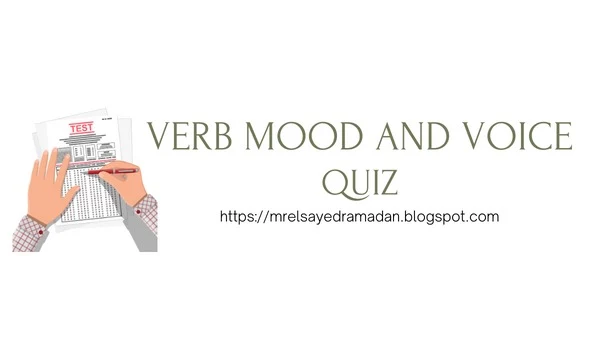The Active and Passive Voices Quiz
The verb mood and voice are critical components of the English language that are often tested in standardized exams for high school students. Understanding and mastery of verb mood and voice is essential for clear and effective communication, as well as for demonstrating proficiency in the English language. The Verb Mood and Voice Quiz is designed to test high school students' knowledge and ability to identify and form sentences in various verb moods and voices.
Verb mood refers to the manner in which a verb is used to indicate the attitude of the speaker or writer towards the action described by the verb. The three main verb moods in English are the indicative, the imperative, and the subjunctive. The indicative mood is used to make statements, the imperative mood is used to give commands, and the subjunctive mood is used to express doubt, wish, or hypothetical situations.
Voice, on the other hand, refers to the relationship between the subject of a sentence and the action described by the verb. There are two voices in English: the active voice and the passive voice. In the active voice, the subject of the sentence performs the action described by the verb. In the passive voice, the subject of the sentence is the recipient of the action described by the verb.
This quiz is intended to help high school students develop their understanding and proficiency in verb mood and voice, which are fundamental skills for success in both their academic and professional lives. The quiz is comprised of a series of multiple-choice questions that will assess students' ability to identify sentences written in different verb moods and voices, as well as their ability to construct sentences in these forms.
By taking this quiz, high school students will have the opportunity to practice and reinforce their understanding of verb mood and voice, and to receive feedback on their performance. This will help to ensure that they are well-prepared for standardized exams and other language assessments, and will also provide them with a useful tool for improving their writing skills more generally.
Samuel Langhorne Clemens, who would later come to be known as Mark Twain, would have been 25 years old when the Civil War started in 1861.
If the goalie had not slipped backward, he might not have blocked the shot and saved the game.
The ushers demanded that we must turn off our cell phones until the intermission.
As we move through our daily routines, we tend to become agitated when our rituals are changed, our habits are disrupted, or something violates our expectations.
As expected, the rule against protests was dropped by the management, who even expressed sympathy with the workers who had registered their complaints.
If the strong winds and rains would have continued for much longer, the small island town probably would have lost power completely.
Our tour guide suggested that we explore the tiny hillside town, which is nearly 17 centuries old.
As Gina began climbing the long staircase, she wished that she would have wore her pumps instead of high heels.
Our financial advisor strongly suggested that we be more consistent with our investments and even automate monthly transfers from our checking to our retirement account.

